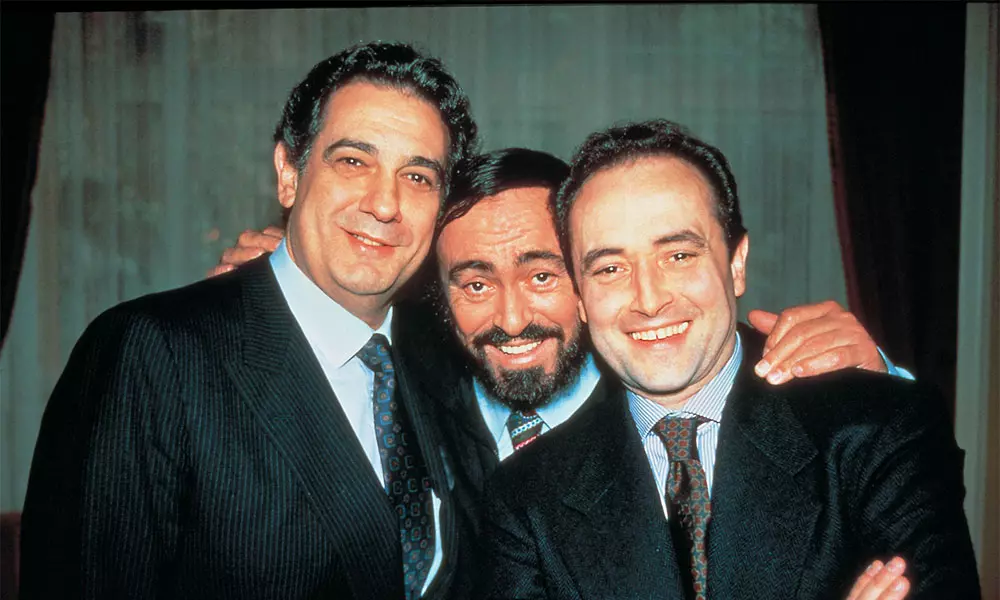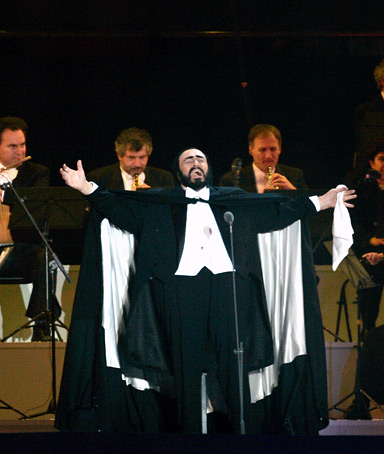Luciano Pavarotti was and is still considered one of the most popular and well-respected performers of his time. His interpretations of classical as well as popular music are some of the most famous in modern history. As one of the most well-known tenors of the 20th century, he performed all over the world at many events and locations, such as the World Cup finals in 1990 and 1994, the base of the Eiffel tower for his concert along with the two other tenors that were part of the renowned Three Tenors, and even the Winter Olympics in Italy in 2006.
Biography
Born to Ferdinand Pavarotti and Adele Venturi, Pavarotti grew up in the small Italian town of Modena where he spent most of his childhood life. For a short time, his family moved to the countryside because of WWII renting a room from a farmer. Pavarotti grew up with a love of sports and music and had an early dream to become a football goalkeeper. Luciano's father was a tenor and they both were a part of the same church choir. Pavarotti's music influence was due largely to his father's selection of recordings he had, one of whom was Guiseppe Di Stefano, an extremely popular opera tenor, who was very famous at the time. After going to college for a couple years to become a professional soccer player, Luciano's mother convinced him to study to become a teacher, and eventually, he started to pursue his career in music. He studied under a few prodigious instructors, including Arrigo Pola, a native of Modena who was well respected in the area, and then Ettore Campogalliani, a renowned Italian composer and teacher, who taught many other well-known performers. At this time Campagalliani was also teaching Luciano's childhood friend, Mirella Freni, another well known Italian singer, whom he would collaborate with later in their careers. Pavarotti started out his career in small opera houses around Italy, gradually working his way up to higher standards, eventually making his first international performance in Yugoslavia, in an opera called La Traviata. From there, Pavarotti began to gain traction, steadily performing in Operas and concerts all over the world, touring with a group named the Three tenors, consisting of himself and two Spaniards, Placido Domingo and Jose Carreras. Their first performance together at the Baths of Caracalla for the 1990 FIFA world cup final was met with very positive feedback, becoming the best selling classical album in history. In his final years, Pavarotti performed all over the world in a farewell tour that included 40 cities. His last performance was at the 2006 winter Olympics, which was actually prerecorded due to the weather conditions being unsuitable for performance. In July 2006, While Pavarotti was still doing his tour, he was diagnosed with pancreatic cancer and struggled with it until September when he eventually succumbed to its effects. His funeral was held at the Modena Cathedral and was telecast by CNN. The then Prime Minister of Ital, Romano Prodi, and his wife Frecce Tricolori attended as well.
Performance role/ Opinion
Luciano Pavarotti was and is one of the most prominent performers of modern-day classical music. His Distinctive vocals and effortless high notes are renowned around the world and he will be long remembered for his outstanding performances across the globe. His clear powerful voice mixed well with other voices and orchestras and has one of the best voices still today. I think he was crucial to not only the classical community but also as a bridge between older and more modern music. He showed the world that classical music could be incorporated into pop culture and still be relevant. This was all possible through his pure love for music. Even with his flaws, he still carried on and did and what he loved his whole life, making classical music attractive for everyone and boosting its popularity.
With James Brown: It's a Man's World
Luciano Pavarotti. (2020, November 03). Retrieved from https://en.wikipedia.org/wiki/Luciano_Pavarotti
The Luciano Pavarotti Foundation: Official website. (n.d.). Retrieved November 4, 2020, from https://www.lucianopavarottifoundation.com/en/
Kennicott, P. (2015, March 13). Luciano Pavarotti – the birth of a legend. Retrieved November 4, 2020, from https://www.gramophone.co.uk/features/article/luciano-pavarotti-the-birth-of-a-legend
:format(jpeg):mode_rgb():quality(90)/discogs-images/A-55683-1567425374-5104.jpeg.jpg)



Luciano Pavarotti was and still is even after his passing, an amazing performer. He has a very strong vocal range and his operatic singing is calming and unique from other singers. I like that you added in a lot about his background. I didn't know all this about him and it was good to read some more of his history. I'm pretty sure I have some of his songs on my laptop in a playlist. I went through a phase where all I listened to was opera and I had his songs mixed in with a bunch of others. Wonderful post Ben! Thank you for sharing about Pavarotti and his wonderful voice and performances.
ReplyDelete